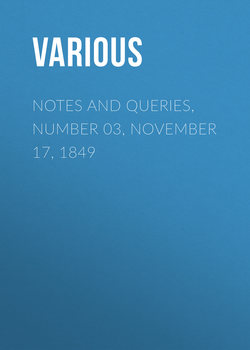Читать книгу Notes and Queries, Number 03, November 17, 1849 - Various - Страница 3
LETTERS OF LORD NELSON'S BROTHER IMMEDIATELY AFTER THE BATTLE OF TRAFALGAR
Оглавление[The following letters will be best illustrated by a few words derived from the valuable life of our great naval hero lately published by Mr. Pettigrew. Besides his last will, properly so called, which had been some time executed, Lord Nelson wrote and signed another paper of testamentary character immediately before he commenced the battle of Trafalgar. It contained an enumeration of certain public services performed by Lady Hamilton, and a request that she might be provided for by the country. "Could I have rewarded those services," Lord Nelson says, "I would not now call upon my country; but as that has not been in my power, I leave Emma Hamilton, therefore, a legacy to my king and country, that will give her ample provision to maintain her rank in life." He also recommended to the beneficence of his country his adopted daughter. "My relations," he concludes, "it is needless to mention; they will of course be amply provided for."
This paper was delivered over to Lord Nelson's brother, together with his will. "Earl Nelson, with his wife and family, were then with Lady Hamilton, and had indeed been living with her many months. To their son Horatio, afterwards Viscount Trafalgar, she was as attentive as a mother, and their daughter had been almost exclusively under her care for education for six years. The Earl kept the codicil in his pocket until the day 120,000l. was voted for him by the House of Commons. On that day he dined with Lady Hamilton in Clarges Street, and learning at table what had been done, he brought forth the codicil, and throwing it to Lady Hamilton, coarsely said, she might now do with it as she pleased."—Pettigrew's Memoirs of Nelson, ii. 624, 625. Lady Hamilton took the paper to Doctors' Commons, where it stands registered as a codicil to Nelson's will. A knowledge of these circumstances is necessary to the full understanding of our correspondents communication.]
Sir,—The following letters may be found interesting as illustrative of the private history of Lord Nelson, to which public attention has been strongly drawn of late by the able work of Mr. Pettigrew. The letters were addressed by Earl Nelson to the Rev. A.J. Scott, the friend and chaplain of the fallen hero.
18, Charles Street, Berkeley Square,
Dec. 2. 1805.
Dear Sir,—I am this day favoured with your obliging letter of October 27.3 The afflicting intelligence you designed to prepare me for had arrived much sooner; but I am duly sensible of the kind motive which inducted this mark of your attention and remembrance.
The King has been pleased to command that his great and gallant servant shall be buried with funeral honours suitable to the splendid services he rendered to his country, and that the body shall be conveyed by water to Greenwich, in order to be laid in state. For myself I need not say how anxious I am to pay every tribute of affection and of respect to my honoured and lamented brother's remains. And it affords me great satisfaction to learn your intention of accompanying them till deposited in their last earthly mansion. The coffin made of the L'Orient's mast will be sent to Greenwich to await the arrival of the body, and I hope there to have an opportunity of making my acknowledgments in person.
Believe me, dear Sir,
Your faithful friend, and obedient humble servant,
NELSON.
I beg the favour of your transmitting to me by the first safe opportunity such of my dear brother's papers (not of a public nature) as are under your care, and of making for me (with my sincere regards and kind compliments) to Captain Hardy the like request.
Please to let me hear from you the moment you arrive at Portsmouth and direct to me as above, when I will send you any further directions I may have received from ministers.
18 Charles Street, Berkeley Square,
Dec. 6. 1805.
My dear Sir,—I have this moment received your kind letter. I do not know I can add any thing to my former letter to you, or to what I have written to Captain Hardy. I will speak fully to Mr. Chevalier4 before he leaves me.
Your faithful and obliged humble servant,
NELSON.
It will be of great importance that I am in possession of his last will and codicils as soon as possible—no one can say that it does not contain among other things, many directions relative to his funeral.
18 Charles Street, Berkeley Square,
Dec. 13. 1805.
Dear Sir,—I have been to the Admiralty, and I am assured that leave will be sent to you to quit the ship, and follow the remains of my dear brother when you please. We have determined to send Mr. Tyson with the coffin to the Victory, when we know she is at the Nore. He, together with Captain hardy and yourself, will see the body safely deposited therein. I trust to the affection of all for that. The Admiralty will order the Commissioner's yacht at Sheerness to receive it, and bring it to Greenwich. I suppose an order from the Admiralty will go to Captain Hardy to deliver the body to Mr. Tyson, and you will of course attend. But if this should be omitted by any mistake of office, I trust Captain Hardy will have no difficulty.
3
The Battle of Trafalgar was fought October 21.
4
Lord Nelson's steward in the Victory.
